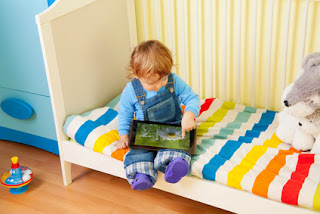CyberMonday Tablets for Young kids: How young is too young?
How Tablets & Educational Games Affect Childhood Development
by Rafael Pittman
Sales for Apple iPads have increased by 22 percent during its most recent quarter, says Apple CEO Tim Cook on VentureBeat.com. The company also reports a 94 percent tablet market share in education, securely positioning the iPad as a fun learning tool for classrooms and households. Tablets are revolutionizing how children play and learn, whether they are playing a learning-based game on an iPad or a game on the LeapPad Ultra tablet.
How young is too young for children to use iPads? Based on research, it's subjectively never too young to expose your little one to technology. Digital devices are becoming increasingly more essential, and young children are also engaged in those devices. Thirty-eight percent of children age 2 and younger use mobile media, such as tablets, according to the Fall 2013 Common Sense Media study "Zero to Eight: Children's Media Use in America 2013." To emphasize the growing use of technology by adolescents, the study found that 17 percent of children use mobile devices at least once a day or more. Critics' knee-jerk reaction to these findings is that technological consumption will retard a child's brain development and cultivate socially inept robot kids. The nature of childhood is organically changing, whether technology advances or delays the growth of a 10-year-old child or a 2-year-old child. Change is evident, and eventually tablets and learning games may carry zero stigma.
Educational institutions recognize the influence that mobile media has on academics and learning. Apple and the Los Angeles Unified school district made made a multi-million dollar deal to equip each student in the district with an iPad, according to VentureBeat.com. Education Week supports the powerful relationship between technology and childhood development by reporting that "total shipments for tablet computing devices in the U.S. education marketplace are expected to exceed 3.5 million units" by the end of the year.
As classrooms become increasingly digitized, they are also experiencing an increase in educational gamification — using game-based methods for teaching. Digital games can maximize learning experiences because they encourage children to explore ideas, test solutions and acquire skills while conquering levels for advancement, describes MindShift. A recent Joan Ganz Cooney Center survey noted that half of the 505 teachers surveyed engage their students with digital games two or more days a week, and 18 percent teach with digital games every day.
Parents can mimic the positive influence gaming has on adolescent development with at-home learning using tablets. Gizmag.com features the following kid-friendly tablets, including:
For the iPad, Common Sense Media lists various gaming and learning apps, including:
Balance is key for families introducing tablet games into the home. For the upcoming holidays, young families can complement tablet learning by giving kids hands-on kids' toys and games that also foster childhood learning and development.
About the Author
Rafael Pittman
by Rafael Pittman
Sales for Apple iPads have increased by 22 percent during its most recent quarter, says Apple CEO Tim Cook on VentureBeat.com. The company also reports a 94 percent tablet market share in education, securely positioning the iPad as a fun learning tool for classrooms and households. Tablets are revolutionizing how children play and learn, whether they are playing a learning-based game on an iPad or a game on the LeapPad Ultra tablet.
Babies Using Tablets
Gamficiation & Learning Tools
As classrooms become increasingly digitized, they are also experiencing an increase in educational gamification — using game-based methods for teaching. Digital games can maximize learning experiences because they encourage children to explore ideas, test solutions and acquire skills while conquering levels for advancement, describes MindShift. A recent Joan Ganz Cooney Center survey noted that half of the 505 teachers surveyed engage their students with digital games two or more days a week, and 18 percent teach with digital games every day.
Tablets & Apps for Kids at Home
- LeadPad Ultra
- VTech InnoTab 3S
- nabi Jr
- nabi 2
- Samsung Galaxy Tab 3 Kids
- Kindle Fire HD
For the iPad, Common Sense Media lists various gaming and learning apps, including:
- Grover's Number Special (Math)
- Bugs and Numbers (Math)
- Dora ABCs Vol 2: Rhyming Words (Preschool)
- Money Preschool Lunchbox (Preschool)
- Duck's Alphabet (Reading)
- Martha Speaks Dog Party (Reading)
- Drawing Pad (Creativity)
- 123D Sculpt (Creativity)
Balance is key for families introducing tablet games into the home. For the upcoming holidays, young families can complement tablet learning by giving kids hands-on kids' toys and games that also foster childhood learning and development.
About the Author
Rafael Pittman
Rafael has his master's in education administration and reports on trends in the classroom.



Comments
Post a Comment